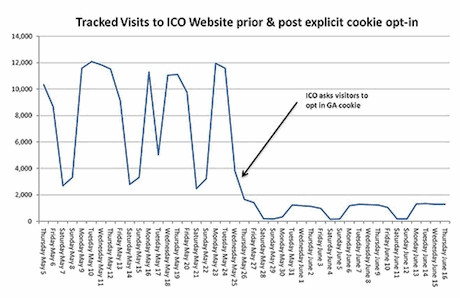
Update: Cookiepocalypse is over (possibly). The ICO have updated their advice, suggesting implied consent is sufficient for users. Read more
This one is going to run and run. I'm predicting that anyone in digital is going to be an expert in cookies by the end of the Summer. And not the nice baked versions either, sadly.
Imagine a 90% drop in website visitors that are willing to accept a cookie from your website. be tracked through your analytics tool? Or your advertising targeting? Or your third party shopping basket? Ouch.
That's what happened with the Information Commissioner's Office (ICO) implemented the new law with existing technology, over 90% of site visitors declined to accept a Google Analytics cookie, thereby disappearing from their analytics.
Whilst the powers-that-be have allowed a year for industry to figure out a way to implement the new 'daft by European standards' cookie law, its impact is dramatic, as illustrated by the graphs obtained by leading web analytics expert, Vicky Brock (@brockyvick), under a Freedom of Information (FOI) request.
UPDATE: Vicky has kindly shared the raw data from the FOI request if anyone fancies a spot of number-crunching.






